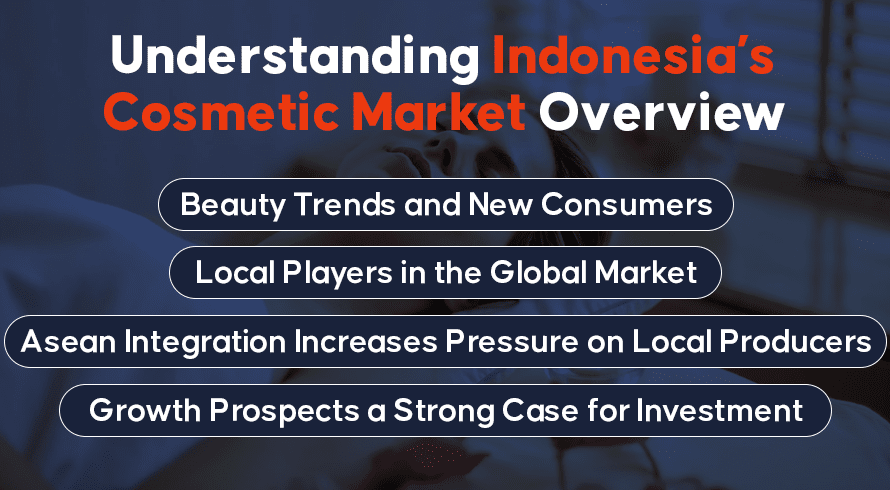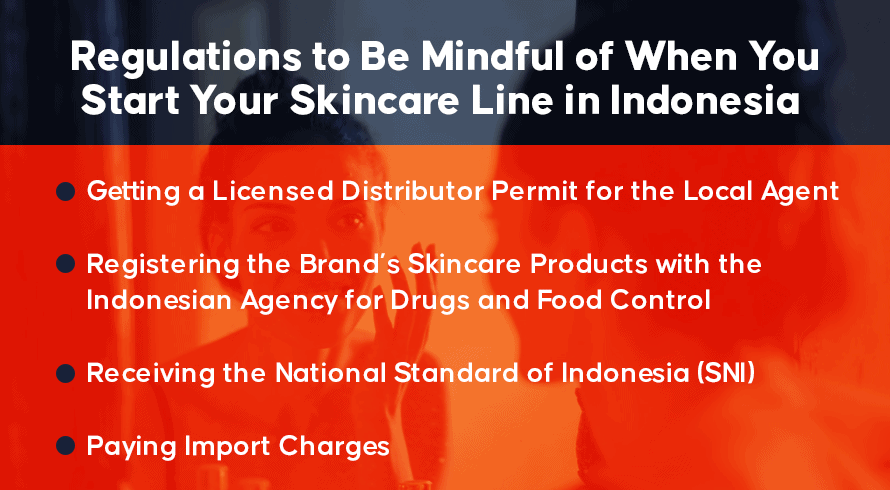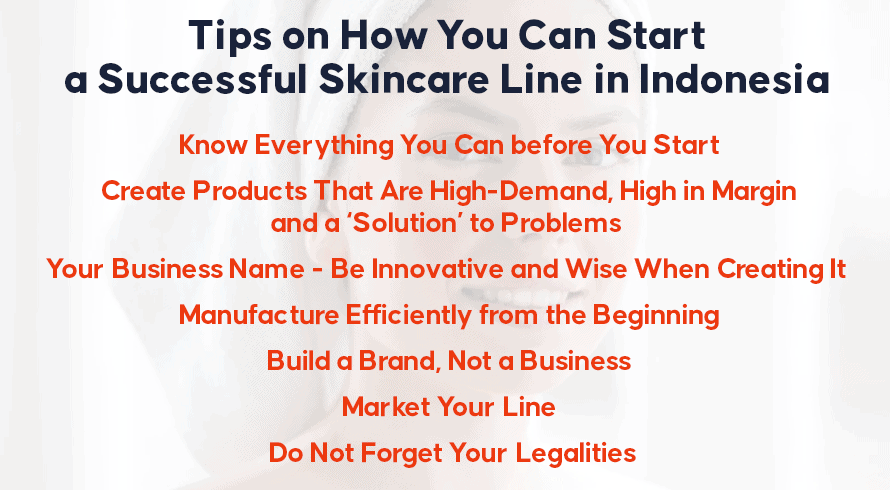Inquivix HQ
1-903, 18 Eonju-ro 146-gil,
Gangnam-gu, Seoul, Korea
06057

Are you thinking of starting a skincare line in Indonesia? This can be an exciting and rewarding endeavor, but there are a few things to keep in mind before getting started. In this blog post, we’ll share some tips on how to start a skincare line in Indonesia, from choosing the right products to marketing your new business. So if you’re ready to jump into the world of Indonesian skincare, read on for some helpful advice.
Understanding Indonesia’s Cosmetic Market Overview
Indonesia is a huge market for skincare products. However, the skincare industry is highly fragmented, with numerous small players competing against each other. To be successful in this market, you’ll need to understand the unique dynamics of the Indonesian cosmetic industry.
With Indonesia’s rapid economic growth, the cosmetics industry is certainly one to keep an eye on. Consumers’ growing ability to pay for everyday luxuries will benefit many goods, especially beauty and skincare items. The cosmetics market in Indonesia has been expanding at a rapid rate for some time already, but there is still a lot of untapped potential because Indonesia’s population is increasing in size and purchasing power. The number of male consumers of cosmetics in Indonesia is slowly beginning to grow.

Beauty Trends and New Customers
In general, the latest Indonesian beauty trends encourage the use of skincare products. In Indonesia, having flawless and fair skin is seen as a kind of beauty ideal in both males and females. The fair-skin beauty ideal has been promoted via advertising, as well as through social media among the country’s younger generation. The popularity of cosmetics in rural areas has increased, opening new opportunities for cosmetic businesses. Another new consumer segment that the cosmetics industry has reached is Indonesian men. The cosmetic product lines targeting men have had very high growth rates.
Local Players in the Global Market
Global cosmetics brands have long-established their presence in Indonesia. However, there are emerging local players joining the competition. Even if the high-income earners prefer global brands, local brands have found their footing and are finding new ways to thrive. Some of these local brands have become major exporters of cosmetics with the unique selling point of using natural ingredients.
ASEAN Integration Increases Pressure on Local Producers
Being part of the Association of Southeast Asian Nations (ASEAN), the reduction in trade barriers has encouraged Indonesian cosmetic companies to trade in the region. But the regulations set by the ASEAN Harmonized Cosmetic Regulatory Scheme require Indonesia to accept products from other member countries, increasing the competition for the local companies and adding pressure on them.
Growth Prospects and a Strong Case for Investment
The beauty industry in Indonesia will not be diminished by increased competition. The country is a highly appealing market due to strong demand growth from first-time users among male and rural individuals, as well as the expensive tastes and rising affluence in major cities. At the same time, the opportunity of entering into ASEAN lets local companies reach more consumers.
Regulations to Be Mindful of When You Start Your Skincare Line in Indonesia
In Indonesia, the cosmetics and skincare market is regulated to safeguard consumer interests. Any and all cosmetics and skincare items produced locally or imported will have to be licensed before being sold. The license is to guarantee that the skincare products released in the Indonesian market meet the BPOM’s essential quality, safety, design, and purpose criteria. Here are some of the main regulations you need to consider when you start your own skincare line in Indonesia.

Getting a Licensed Distributor Permit for the Local Agent
Before being able to sell your products in Indonesia, a “distributor license” has to be gained. This is necessary to receive goods from the manufacturer or business. These distributors are called the official merchants of your brand’s products.
Registering the brand’s skincare products with the Indonesian Agency for Drugs and Food Control
The Indonesian Agency for Drug and Food Control (BPOM), is the body in charge of cosmetics and skincare products registration. It is run by Indonesia’s Ministry of Health and Welfare. All your skincare products have to be registered in BPOM before they enter the market. You must have a business or a local distributor that will have to register your items under an Indonesian organization.
Receiving the National Standard of Indonesia (SNI)
If you want to launch a skincare product line in Indonesia, it is advisable to obtain SNI accreditation. It will allow you to have a better, more profitable, and smoothly running business with SNI accreditation.
The organizations getting SNI accreditation assures buyers about their safety, quality, and overall standards. The Indonesian government has defined the SNI standards with the World Trade Organization’s Code of Good Practice in order for the accreditation to be recognized and widely accepted by businesses in Indonesia.
Pay Import Charges
The import tariff on cosmetic and skincare products coming to Indonesia will be classified under Health and Beauty (CDF categories). It is calculated on the total cost of the product, insurance costs, and shipment/delivery costs. The import tax for skincare and cosmetics items is usually 10%.
Tips on How You Can Start a Successful Skincare Line in Indonesia
If you have ever dreamt of starting your own skincare line, Indonesia is the perfect place to do it. The skincare industry in Indonesia is booming, and there is a lot of room for new players to make their mark. Here are some tips on how you can start a successful skincare line in Indonesia.

Know Everything You Can before You Start
You don’t have to be an expert dermatologist to start your own skincare line. However, it is important to have knowledge about skin in general, your products, and who and how they may assist. New discoveries in technology and science are continuously emerging—we’ll never reach a point in skincare when we can just stop learning. Never give up on keeping informed.
Create Products That Are High-Demand, High in Margin and a “Solution” to Problems.
You may be planning to build a complete range of skincare, but if you’re just getting started, it can be useful to create an identity with a “hero” product. The hero product is what you will be most known for. Make sure you’re creating a product that’s has a high demand, is effective, and positively impacts lives. It’s also not a bad idea if you’re manufacturing something with a high-profit margin potential.
Your Business Name: Be Innovative and Wise When Creating It.
Consumers adore well-branded goods, quality brands, and excellent marketing. It stands to reason that a carefully chosen name for your items, line, and company should be advantageous to you. Don’t be afraid to be innovative and creative. After you’ve come up with a few name options, it is crucial to ensure that they are available and do not violate copyrights.
Manufacture Efficiently from the Beginning
Another tip for a successful skincare product business is efficient manufacturing. You can plan to manufacture in-house or with an external factory. It’s crucial to stay within a budget when it comes to running a skincare line, but it’s important that you work with a reliable manufacturer that would guarantee quality and efficiency, not simply the cheapest option.
Build a Brand, Not a Business.
Starting a skincare line doesn’t stop at starting the business. You need to build a brand. Your brand should tell a story that people could relate to and identify with. The consumers will recognize the brand, the foundation, and what it stands for. Take the time to develop a brand theme, narrative, and solid foundation for your company to stand on rather than just launching a firm and slapping a name on it.
Market Your Line
Once you’ve finalized your skincare line, gotten it licensed and operational, as well as developed a lovely brand, you have to market them! Start with the basics and move on to advanced marketing campaigns. In today’s digital era, social media is a powerful marketing tool. Use it strategically to run your marketing campaign. It’s also a good idea to use proven traditional methods, such as selling wholesale to local health shops, spas, and salons. Word of mouth is a great promotional tool to build trust among consumers, especially for products in this category.
Do Not Forget Your Legalities
All of the necessary licenses must be prepared, including those required to operate a business, establish a skincare line, and so on. Obtain any and all necessary permits. If you need to get product liability insurance, go ahead and do it. Check with a local business attorney to ensure that you are fully prepared from all angles.
Understanding Indonesia’s Skincare Product Market
Valued at $9,758 million in 2019, the Indonesian skincare market is expected to grow to $14,716 million by 2027 with a compound annual growth rate (CAGR) of 7.5% over the next decade according to market research.
Skincare products include a wide range targeted at different skin types (dry skin, sensitive skin, etc.), and skin problems (dark circles, premature aging, etc.). Moisturizers, lotions, cleansing products (facial cleansers, facial toners, etc), day cream, sheet masks, and serum products are also gaining popularity.

It is divided by gender, according to the demographic, and is split into generations X, millennial, and Z according to age groups. According to distribution channels, the market is fragmented into supermarket/hypermarkets, specialty stores, department stores, beauty salons, pharmacies & drug stores, and online sales channels (eCommerce sites and online stores). The existing brands in the Indonesian skincare market have used new product introduction as a key strategy to grow market share and profitability. It has also helped them to stay competitive.
Conclusion
If you want to start a skincare product line in Indonesia, it’s important to do your research and understand the market. There are many different types of skincare products that are popular in Indonesia, so make sure you tailor your line to meet the needs of Indonesian consumers. With a little planning and effort, you can create a successful skincare product line in this growing market.
So, what do you think? Are you inspired to start your own skincare line? If so, we’re here to help. We have a lot of experience in the Indonesian market and can guide you through every step of the marketing process. Let us know if you want to learn more about how we can help make your entrepreneurial dreams a reality.
